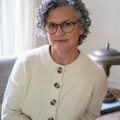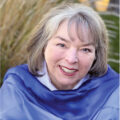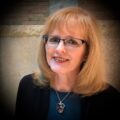Author of Firefly

by Trisha Bleau Smith
T4JYM: I loved the reading Firefly. Where did the idea come from?
RH: First, let me thank you for your kind words. I am especially grateful because of the fantastic ministry you are establishing. To be associated with it in any way it is an honor indeed!
The idea for my book started with my grandmother. She had a whole collection of papers about a couple of our ancestors who were from Marblehead, Massachusetts, and played memorable roles in the American Revolution.
At the beginning, I just wanted to write their story. However, once I began to do serious research, I realized how little I knew about the times I was trying to write about. Like most Americans, I knew the big names (George Washington, the Founding Fathers, etc.) and the epic battles (Bunker Hill, Yorktown, etc.) and, of course, the Declaration of Independence. But that’s about all I knew. As research continued in Massachusetts and the Hudson River/Lake Champlain area, I began to get a feel for life and lore of 18th century New Englanders. I learned about the roles Native Americans played, the savagery of the frontier, the wrath of the Tories, the miserable British prison ships, the details of America’s first submarine. The social differences that existed made for a perfect “impossible” love story. I also discovered some unexplained incidents that may have helped save the Patriots from defeat in the early months of the war. My imagination took over and a story began to emerge with my ancestors reduced to very minor roles.
T4JYM: Would you consider “Firefly” a Christian book?
RH: That’s interesting because I think it is secular though I always wanted it to carry a Christian undercurrent. I told a devout friend what I wanted to do and he read the book and reported that just when he thought there was nothing spiritual in it, it jumped out and grabbed him. I do weave the clash between Native American and Christian spiritualities into the tale, and my main female character is an audacious, indomitable, spirit-filled young woman. Other characters stand up for what they believe and one, a Moravian Indian, suffers tragically as a consequence. I am not a theologian nor am I a Christian book writer of the ilk of Francine Rivers or Randy Alcorn. If there is a Christian message in “Firefly”, especially if it meaningful to teenagers, all I can say is, “Thanks be to God.”
T4JYM: How much editing went into the process of writing this book?
RH: It took nearly three years to write “Firefly” so a lot of self-editing went on in the process. My publisher provided an editor and I paid a friend, a grammarian, to edit it as well.
T4JYM: Was your book rejected by any publishers?
RH: I got my share of rejections. However, the greatest response I got was no response at all. Big time agents and publishers are simply inundated with submissions these days. Unless you know someone in the business or are a big name author, you and your work will most likely end up in what is known as the slush pile of submissions that seldom, if ever, get read. It’s the reason John Grisham and Ernest Hemingway self-published their first novels. There are exceptions, of course, but rejections and no-responses are par for the course. Once I quit thinking big publisher, I had better luck. My firm is small and is located in the state of Washington.
T4JYM: How has the book been received by the general public?
RH: Reader response has far exceeded my fondest expectations. That includes the T4J review! Some readers have even sent great reviews in to Barnes&Noble.com and Amazon.com after buying “Firefly” on-line. I’m not sure the reviews have caused any increase in sales, but just knowing some readers liked the book is reward enough. There has been no negative feedback so far, though I’m sure I deserve some.
T4JYM: What are your next plans for writing?
RH: I think the readers’ reviews have convinced me to stick with historical fiction right now. Many other ideas have rattled around in my mind, but I am focusing more and more on a sequel. I want to include a Christian view of atheism and slavery, and maybe tell a story of hope this time, and a sequel to “Firefly” seems to be the best venue.
T4JYM: Have you written any other books?
RH: “Firefly” is my first novel. I’ve been published in Yankee Magazine. I spent 30 years writing for and directing creative departments of advertising agencies so if print ads and TV commercials count, I’ve been ‘published’ thousands of times. (smile)
T4JYM: What training do you have in writing?
RH: I took some writing courses in high school and college and got an MA from the Writing Seminars at Johns Hopkins University. Writing for advertising agencies was good training because it taught me to ‘get to the point’. (There’s only so much space in a print ad and only 30 or 60 seconds in most TV spots.)
T4JYM: What advice would you give to someone interested in pursuing a career in writing?
RH: Get started today! Forget TV. Read! Read! Read! See how other writers express themselves, what word tricks and techniques they use… whether you want to be a novelist or a sportswriter or a poet or a reporter or a historian or a copywriter or a scriptwriter or a playwright or whatever. Write from the heart! Have something to say! Write for yourself, not for what’s “in”. Research your area of interest until you are mind-boggled. Put aside what you write today and look at it tomorrow to see if it still sings. Be hard on yourself. If you have a thought that you can’t quite capture in words, neither will your reader. Wipe the slate clean and start over. Enjoy the adventure.
T4JYM: What advice would you give to someone interested in publishing their works?
RH: I think every writer has to ask him or herself, “Why do I want to get published?” Is it to take sides on an issue? Is it to shed new light on an area of interest and knowledge you possess? Is it to spread the Good News? Is it just to see your words in print? Is it something for family and friends? Is it for fame and money?
If it is for fame and money, I’d try something else. As mentioned, most literary agents and big time publishers are virtually inaccessible to unknown authors. And they are looking only for what will sell. Right now, crime fiction, sci-fi, romance, horror, and social-issue books take up most of the space at the top of the list. As for the money—I know an author who has written five detective novels for a large New York publisher and so far has earned a total of only $6000. For five novels! The fact is, few writers of books make good money. (That fact does not include people whose job it is to write. Columnists, reporters, copywriters, magazine staff writers, all can make very good livings!.) Even if a book sells a few hundred copies, many people take a share of the income. The publisher, the agent, the distributor, the bookstore, the fulfillment people (who fill orders) all have vital roles to play if any book is ever going to see the light of day. Unfortunately, they leave very little, per book, for you. Many thousands of sales are needed before an appreciable amount accrues in the author’s purse or wallet. But don’t be dismayed! All of that is just a reality check. If you want to get published, walk into any bookstore and just see how many others have had the same idea. Most won’t be famous and won’t make money, but all have been published. With God’s blessing so can you!





Be the first to comment